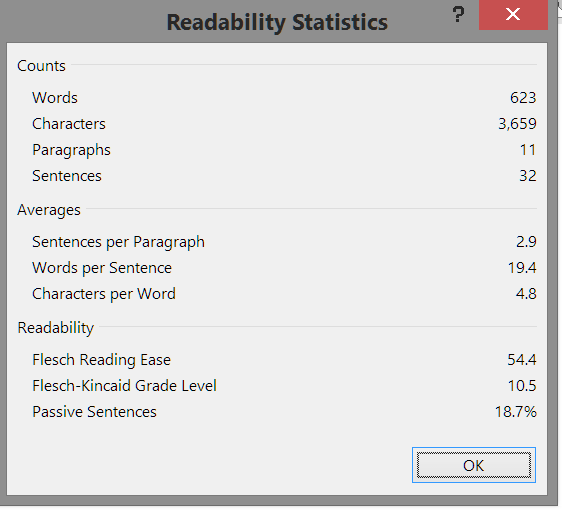
Writing online, I am kind of guessing about who are my readers. I know where they come from geographically and I know how they find me in a search and what articles they read and other analytics. I don't know what their reading level might be and every writing course will tell you that you "need to know your audience."
I make some assumptions that readers of a blog about technology and learning are mostly educators and so I further assume that they have a high school and above reading level. But how do you determine the reading level of what you are writing?
If you write in Microsoft Word, it is simple to use two major readability tests that are built-in: the Flesch Reading Ease and Flesch-Kincaid Grade Level.
For the Flesch Reading Ease and Flesch-Kincaid Grade Level statistics to come be part of the “Spelling & Grammar” review of your content, you will need to enable those statistics. To do this select “File” then “Options” next go to the “Proofing” tab and check the box that says “Show readability statistics.”
Flesch-Kincaid scores are readability tests designed to show how easy or difficult a text is to read. This score is given in two different ways. First is the “Flesch Reading Ease” number which ranges from 0 to 100. With a score of 90-100, your writing could be understood by an average 11-year old and a score of 60-70 could be understood by average 13 to 15-year olds. A score of zero to 30 means your writing could be understood by a university graduate. A bit counterintuitively, the higher the score the easier the writing is to read and comprehend.
For comparison, Time magazine averages at a score of 52 and the Harvard Law Review falls somewhere in the low 30s.
The Flesch-Kincaid Grade Level applies a reading grade level to your writing. I learned many years ago that most general news articles in The New York Times have a tenth-grade reading level. Romance novels have about a fifth-grade reading level.
I ran a recent article here through the test and got the results shown below. The Reading Ease score is about 55 and a Grade Level a tenth-grader in the middle of sophomore year.
 You might think that score seems to be low for a post I am aiming at educators, but many sources will recommend that ease of reading in order to boost your numbers and even in your emails and communications. I know that some researchers have said that your response rate varies by reading level. The article linked here claims that emails written at a 3rd-grade reading level were optimal with a 36% boost over emails written at a college reading level and a 17% higher response rate than emails written even at a high school reading level.
You might think that score seems to be low for a post I am aiming at educators, but many sources will recommend that ease of reading in order to boost your numbers and even in your emails and communications. I know that some researchers have said that your response rate varies by reading level. The article linked here claims that emails written at a 3rd-grade reading level were optimal with a 36% boost over emails written at a college reading level and a 17% higher response rate than emails written even at a high school reading level.
When Microsoft Outlook and Word finish checking the spelling and grammar, you can choose to display information about the reading level of the document using the Flesch Reading Ease test and the Flesch-Kincaid Grade Level test. You can also set your proofreading settings to flag things like jargon, which is often what pushes ease aside and pushes readers to leave.
This may sound like advice to "dumb down" your writing. I don't think it is that. The English major part of me is reminded of Ernest Hemingway's journalistic simplicity. You can still get across deep ideas in simple language. I like the Einstein quote “Everything should be made as simple as possible,
but not simpler.”

 I love the movie
I love the movie  I received another query today about whether I accept
I received another query today about whether I accept 